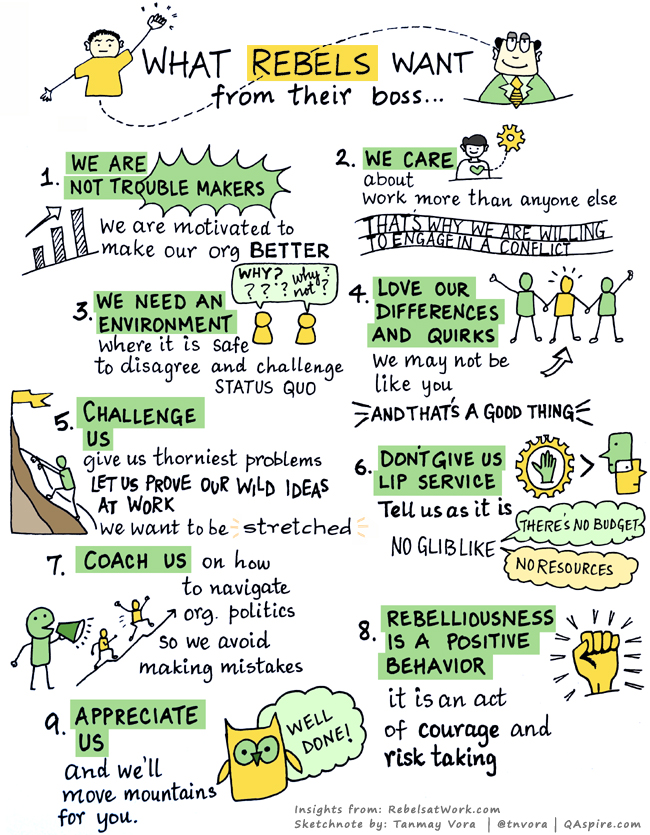Change needs disturbance. Every organization needs people who question the status quo. As jesters or corporate rebels, they cause constructive irritation and thus prevent dangerous stagnation. After the ten principles addressed to the corporate rebels themselves, the question now naturally arises of how to create an environment for constructive rebelliousness and how to lead, challenge and coach rebels.
For this Tanmay Vora published the following beautiful sketchnote under a Creative Commons CC BY-NC-ND 4.0 license based on the original idea of Lois Kelly and Carmen Medina at Rebels at Work.

Leaders who want to promote rebels create a culture in which diversity is appreciated. They create a secure space in which it is both desired and appreciated to question the status quo. And this space extends well beyond the actual area of responsibility of the respective manager. In the jungle of politics in the organization there are enough pitfalls that trigger an immediate and more or less severe immune response of the system. It is the responsibility of the executives to recognize and avoid these pitfalls and thus to protect their rebels. And that makes them rebels themselves.
Management is doing things right; leadership is doing the right things.
Peter F. Drucker
One crucial aspect is missing from the line-up of Lois Kelly and Carmen Medina above, or was implicitly clear to them: rebels need freedom to first and foremost be able to question the status quo and secondly and even more importantly to be able to think and try out new, different and hopefully better things. Yet it would be really great if not only a few selected rebels have this freedom, but as many as possible, so that the rebellious ideas can find positive resonance. Creating this freedom through consistent focus on the essentials and a culture of sustainability in which being busy is not confused with productivity is also an indispensable task for executives.
In such an environment, rebels are comfortable and want and should be challenged. Sometimes all it takes is a small push of empowerment, and dehydrated and encrusted cultures blossom again. Satya Nadella, CEO of Microsoft, describes this empowerment as a key factor in his new book “Hit Refresh”:
The key to the culture change was individual empowerment. We sometimes underestimate what we each can do to make things happen, and overestimate what others need to do for us. I became irritated once during an employee Q&A when someone asked me, “Why can’t I print a document from my mobile phone?” I politely told him, “Make it happen. You have full authority.“
Satya Nadella, Hit Refresh
The longer you think about these leadership tasks, the more you come to the conclusion that all this actually has little to do with rebels. Or to put it another way, every employee should be led like a rebel. Everyone should have the freedom to try out and learn without getting lost in the political mills. Everyone should have the freedom to think outside the box and question the status quo. And everyone should be empowered and encouraged to make use of it.





